Management and Operations Report: Roles of Leader and Manager
VerifiedAdded on 2021/01/01
|12
|2650
|354
Report
AI Summary
This report provides a comprehensive analysis of management and operations, focusing on the roles and responsibilities of leaders and managers within the context of Procter & Gamble. It explores the distinctions between leadership and management, examines various leadership theories, including trait theory, behavioral theories (autocratic, democratic, and laissez-faire), and contingency and situational leadership. The report further delves into the key approaches to operational management, highlighting its significance in achieving business objectives and evaluating how managers and leaders can improve operational efficiencies. It also assesses the factors within the business environment, such as economic, technological, and socio-cultural elements, that influence operational management and decision-making. The report concludes by emphasizing the importance of effective operational management for company success and customer satisfaction, suggesting various approaches to achieve these goals.
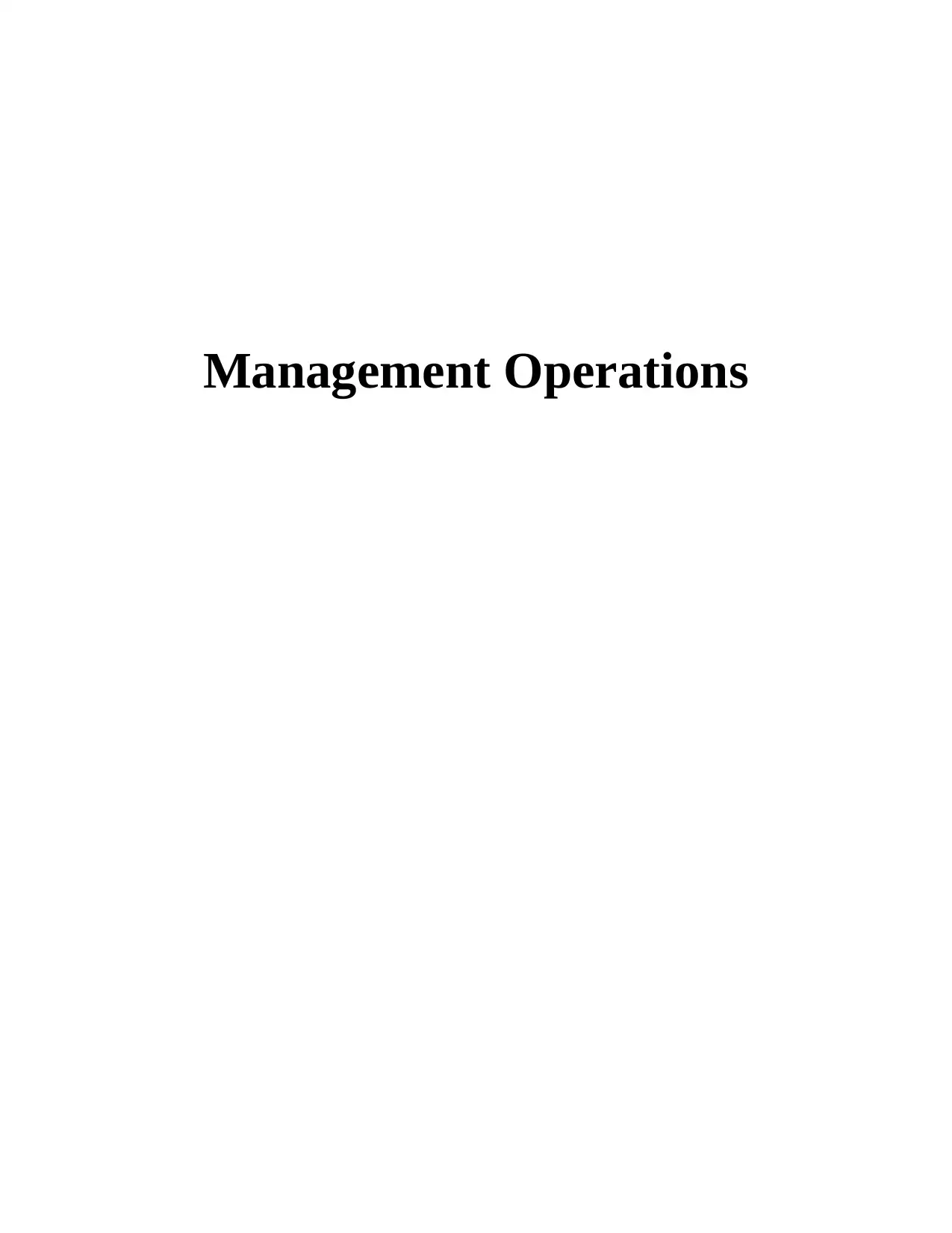
Management Operations
Paraphrase This Document
Need a fresh take? Get an instant paraphrase of this document with our AI Paraphraser
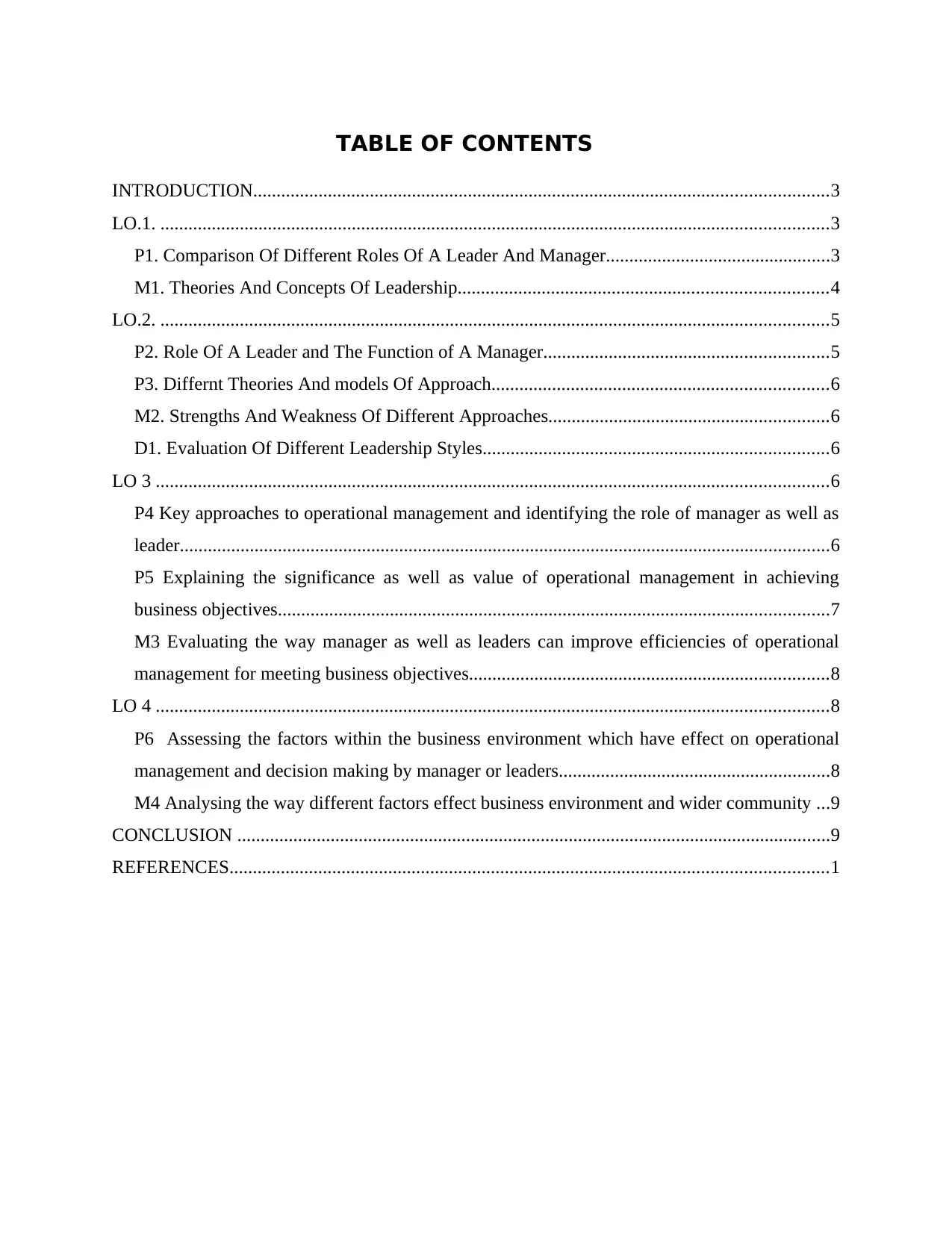
TABLE OF CONTENTS
INTRODUCTION...........................................................................................................................3
LO.1. ...............................................................................................................................................3
P1. Comparison Of Different Roles Of A Leader And Manager................................................3
M1. Theories And Concepts Of Leadership...............................................................................4
LO.2. ...............................................................................................................................................5
P2. Role Of A Leader and The Function of A Manager.............................................................5
P3. Differnt Theories And models Of Approach........................................................................6
M2. Strengths And Weakness Of Different Approaches............................................................6
D1. Evaluation Of Different Leadership Styles..........................................................................6
LO 3 ................................................................................................................................................6
P4 Key approaches to operational management and identifying the role of manager as well as
leader...........................................................................................................................................6
P5 Explaining the significance as well as value of operational management in achieving
business objectives......................................................................................................................7
M3 Evaluating the way manager as well as leaders can improve efficiencies of operational
management for meeting business objectives.............................................................................8
LO 4 ................................................................................................................................................8
P6 Assessing the factors within the business environment which have effect on operational
management and decision making by manager or leaders..........................................................8
M4 Analysing the way different factors effect business environment and wider community ...9
CONCLUSION ...............................................................................................................................9
REFERENCES................................................................................................................................1
INTRODUCTION...........................................................................................................................3
LO.1. ...............................................................................................................................................3
P1. Comparison Of Different Roles Of A Leader And Manager................................................3
M1. Theories And Concepts Of Leadership...............................................................................4
LO.2. ...............................................................................................................................................5
P2. Role Of A Leader and The Function of A Manager.............................................................5
P3. Differnt Theories And models Of Approach........................................................................6
M2. Strengths And Weakness Of Different Approaches............................................................6
D1. Evaluation Of Different Leadership Styles..........................................................................6
LO 3 ................................................................................................................................................6
P4 Key approaches to operational management and identifying the role of manager as well as
leader...........................................................................................................................................6
P5 Explaining the significance as well as value of operational management in achieving
business objectives......................................................................................................................7
M3 Evaluating the way manager as well as leaders can improve efficiencies of operational
management for meeting business objectives.............................................................................8
LO 4 ................................................................................................................................................8
P6 Assessing the factors within the business environment which have effect on operational
management and decision making by manager or leaders..........................................................8
M4 Analysing the way different factors effect business environment and wider community ...9
CONCLUSION ...............................................................................................................................9
REFERENCES................................................................................................................................1
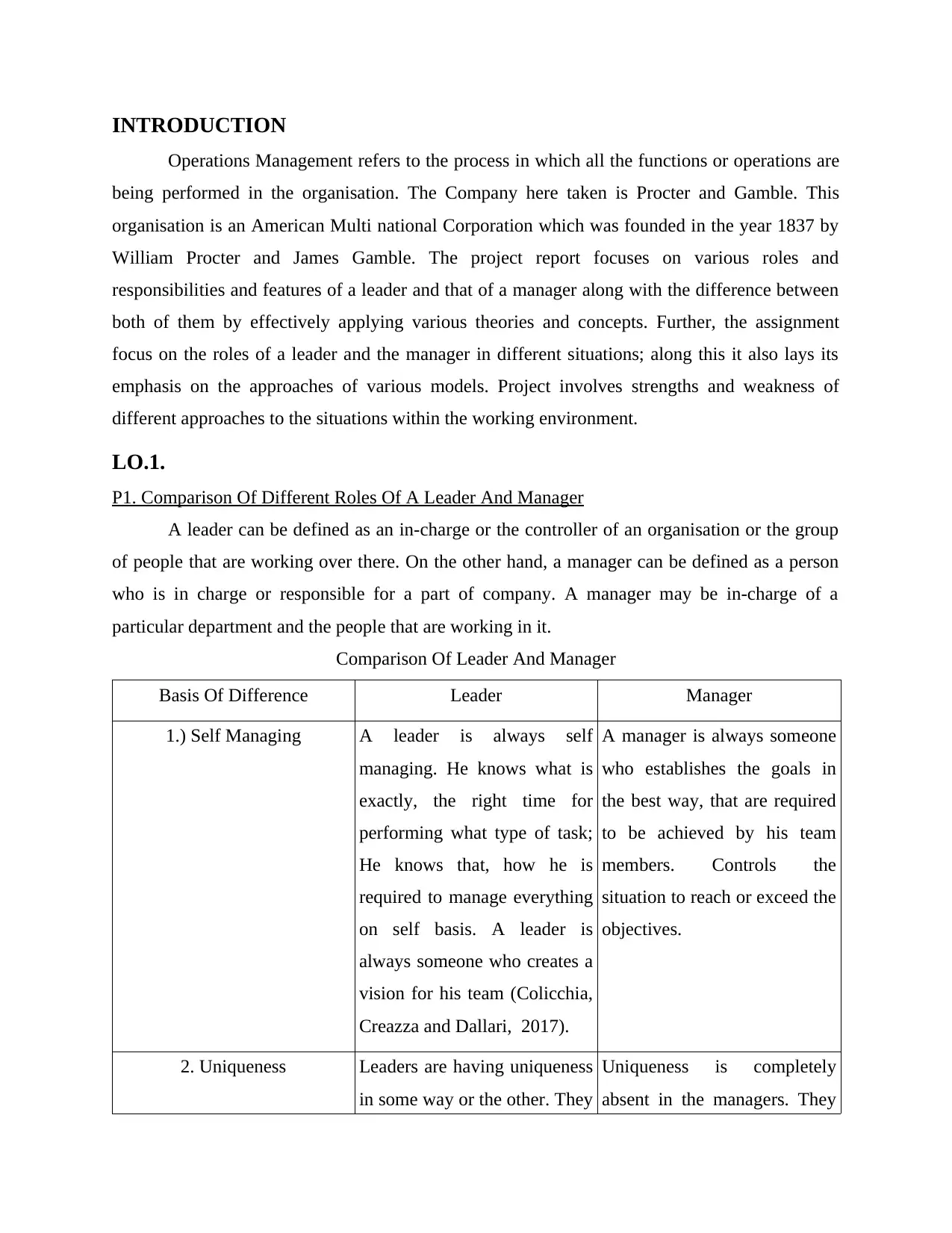
INTRODUCTION
Operations Management refers to the process in which all the functions or operations are
being performed in the organisation. The Company here taken is Procter and Gamble. This
organisation is an American Multi national Corporation which was founded in the year 1837 by
William Procter and James Gamble. The project report focuses on various roles and
responsibilities and features of a leader and that of a manager along with the difference between
both of them by effectively applying various theories and concepts. Further, the assignment
focus on the roles of a leader and the manager in different situations; along this it also lays its
emphasis on the approaches of various models. Project involves strengths and weakness of
different approaches to the situations within the working environment.
LO.1.
P1. Comparison Of Different Roles Of A Leader And Manager
A leader can be defined as an in-charge or the controller of an organisation or the group
of people that are working over there. On the other hand, a manager can be defined as a person
who is in charge or responsible for a part of company. A manager may be in-charge of a
particular department and the people that are working in it.
Comparison Of Leader And Manager
Basis Of Difference Leader Manager
1.) Self Managing A leader is always self
managing. He knows what is
exactly, the right time for
performing what type of task;
He knows that, how he is
required to manage everything
on self basis. A leader is
always someone who creates a
vision for his team (Colicchia,
Creazza and Dallari, 2017).
A manager is always someone
who establishes the goals in
the best way, that are required
to be achieved by his team
members. Controls the
situation to reach or exceed the
objectives.
2. Uniqueness Leaders are having uniqueness
in some way or the other. They
Uniqueness is completely
absent in the managers. They
Operations Management refers to the process in which all the functions or operations are
being performed in the organisation. The Company here taken is Procter and Gamble. This
organisation is an American Multi national Corporation which was founded in the year 1837 by
William Procter and James Gamble. The project report focuses on various roles and
responsibilities and features of a leader and that of a manager along with the difference between
both of them by effectively applying various theories and concepts. Further, the assignment
focus on the roles of a leader and the manager in different situations; along this it also lays its
emphasis on the approaches of various models. Project involves strengths and weakness of
different approaches to the situations within the working environment.
LO.1.
P1. Comparison Of Different Roles Of A Leader And Manager
A leader can be defined as an in-charge or the controller of an organisation or the group
of people that are working over there. On the other hand, a manager can be defined as a person
who is in charge or responsible for a part of company. A manager may be in-charge of a
particular department and the people that are working in it.
Comparison Of Leader And Manager
Basis Of Difference Leader Manager
1.) Self Managing A leader is always self
managing. He knows what is
exactly, the right time for
performing what type of task;
He knows that, how he is
required to manage everything
on self basis. A leader is
always someone who creates a
vision for his team (Colicchia,
Creazza and Dallari, 2017).
A manager is always someone
who establishes the goals in
the best way, that are required
to be achieved by his team
members. Controls the
situation to reach or exceed the
objectives.
2. Uniqueness Leaders are having uniqueness
in some way or the other. They
Uniqueness is completely
absent in the managers. They
⊘ This is a preview!⊘
Do you want full access?
Subscribe today to unlock all pages.

Trusted by 1+ million students worldwide
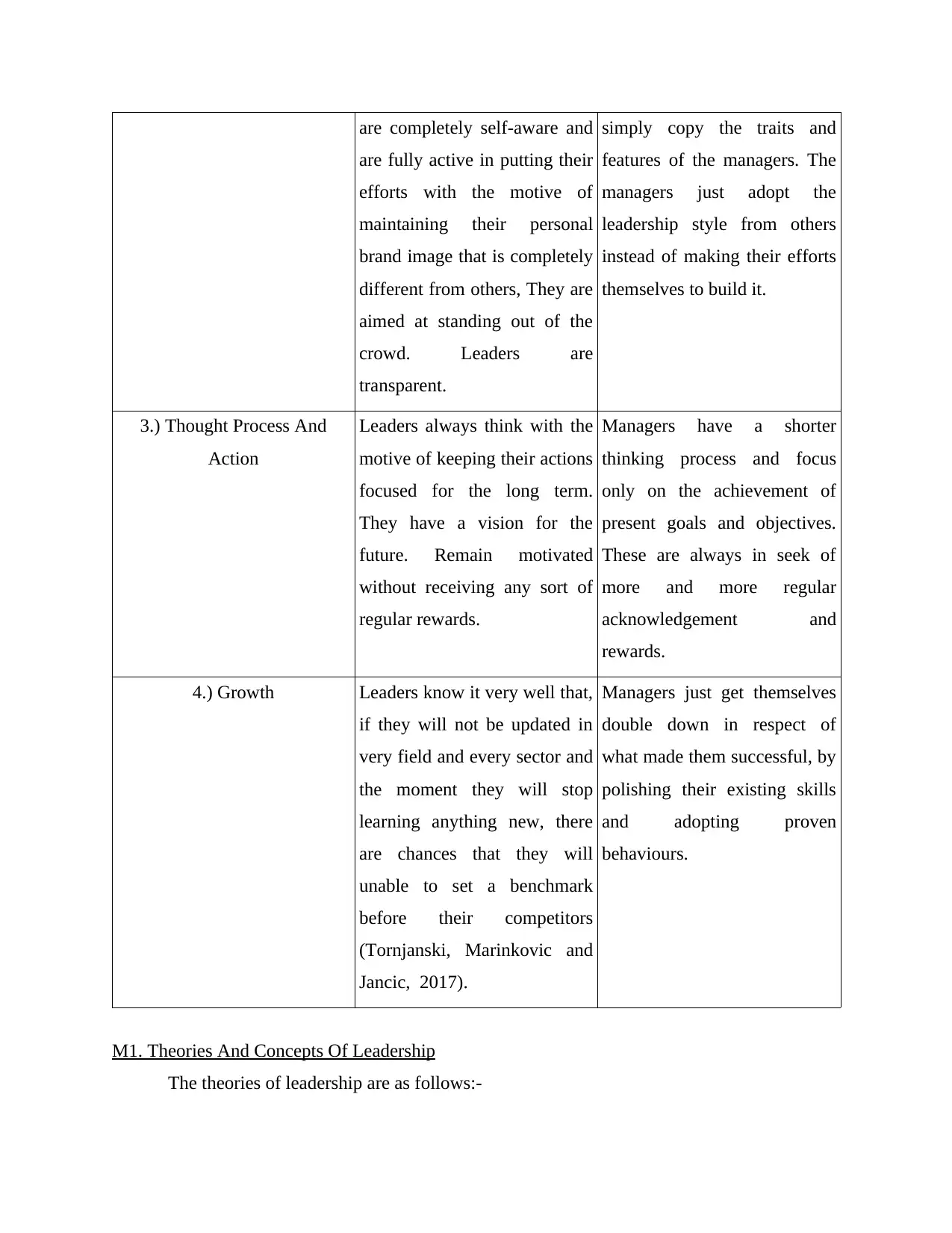
are completely self-aware and
are fully active in putting their
efforts with the motive of
maintaining their personal
brand image that is completely
different from others, They are
aimed at standing out of the
crowd. Leaders are
transparent.
simply copy the traits and
features of the managers. The
managers just adopt the
leadership style from others
instead of making their efforts
themselves to build it.
3.) Thought Process And
Action
Leaders always think with the
motive of keeping their actions
focused for the long term.
They have a vision for the
future. Remain motivated
without receiving any sort of
regular rewards.
Managers have a shorter
thinking process and focus
only on the achievement of
present goals and objectives.
These are always in seek of
more and more regular
acknowledgement and
rewards.
4.) Growth Leaders know it very well that,
if they will not be updated in
very field and every sector and
the moment they will stop
learning anything new, there
are chances that they will
unable to set a benchmark
before their competitors
(Tornjanski, Marinkovic and
Jancic, 2017).
Managers just get themselves
double down in respect of
what made them successful, by
polishing their existing skills
and adopting proven
behaviours.
M1. Theories And Concepts Of Leadership
The theories of leadership are as follows:-
are fully active in putting their
efforts with the motive of
maintaining their personal
brand image that is completely
different from others, They are
aimed at standing out of the
crowd. Leaders are
transparent.
simply copy the traits and
features of the managers. The
managers just adopt the
leadership style from others
instead of making their efforts
themselves to build it.
3.) Thought Process And
Action
Leaders always think with the
motive of keeping their actions
focused for the long term.
They have a vision for the
future. Remain motivated
without receiving any sort of
regular rewards.
Managers have a shorter
thinking process and focus
only on the achievement of
present goals and objectives.
These are always in seek of
more and more regular
acknowledgement and
rewards.
4.) Growth Leaders know it very well that,
if they will not be updated in
very field and every sector and
the moment they will stop
learning anything new, there
are chances that they will
unable to set a benchmark
before their competitors
(Tornjanski, Marinkovic and
Jancic, 2017).
Managers just get themselves
double down in respect of
what made them successful, by
polishing their existing skills
and adopting proven
behaviours.
M1. Theories And Concepts Of Leadership
The theories of leadership are as follows:-
Paraphrase This Document
Need a fresh take? Get an instant paraphrase of this document with our AI Paraphraser
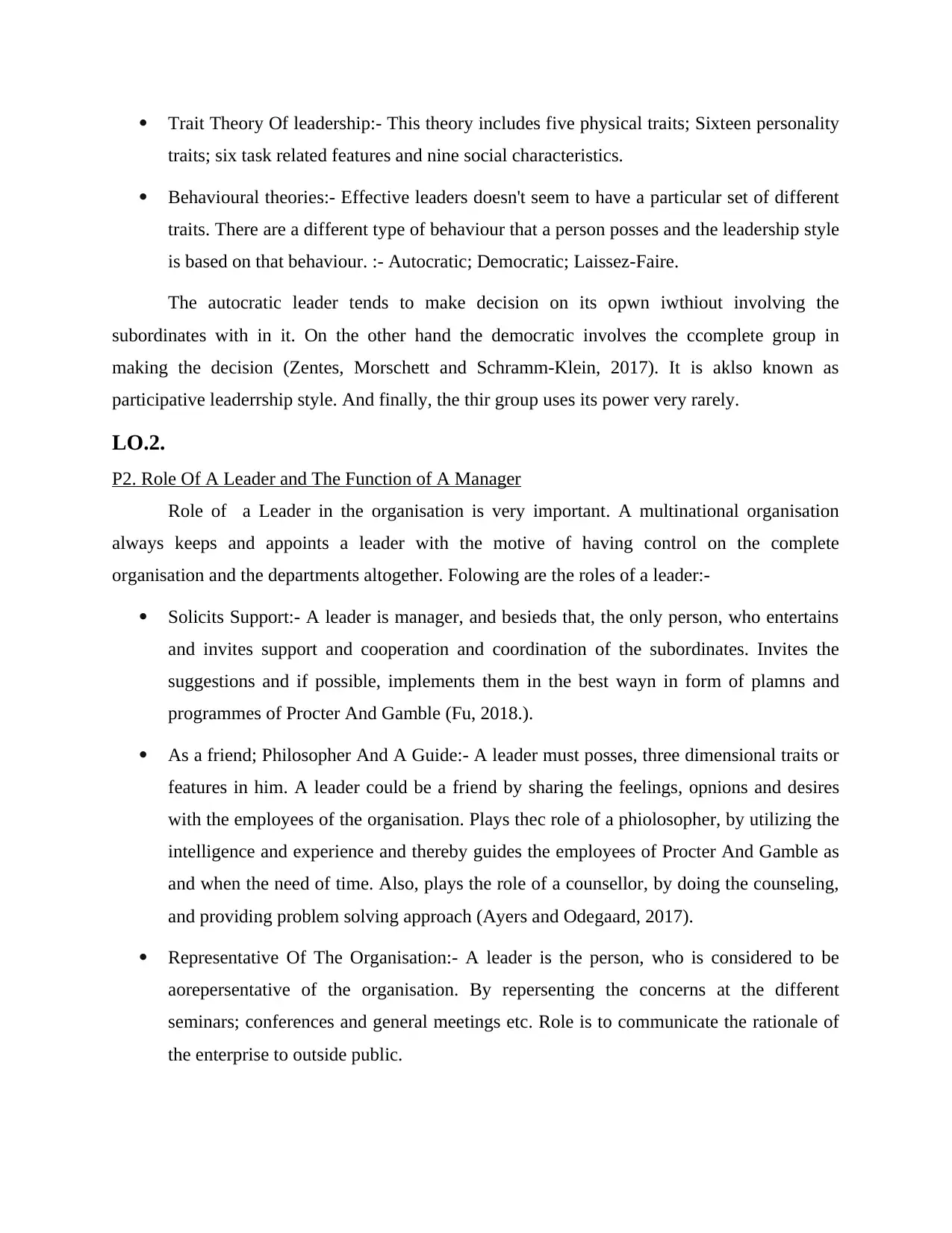
Trait Theory Of leadership:- This theory includes five physical traits; Sixteen personality
traits; six task related features and nine social characteristics.
Behavioural theories:- Effective leaders doesn't seem to have a particular set of different
traits. There are a different type of behaviour that a person posses and the leadership style
is based on that behaviour. :- Autocratic; Democratic; Laissez-Faire.
The autocratic leader tends to make decision on its opwn iwthiout involving the
subordinates with in it. On the other hand the democratic involves the ccomplete group in
making the decision (Zentes, Morschett and Schramm-Klein, 2017). It is aklso known as
participative leaderrship style. And finally, the thir group uses its power very rarely.
LO.2.
P2. Role Of A Leader and The Function of A Manager
Role of a Leader in the organisation is very important. A multinational organisation
always keeps and appoints a leader with the motive of having control on the complete
organisation and the departments altogether. Folowing are the roles of a leader:-
Solicits Support:- A leader is manager, and besieds that, the only person, who entertains
and invites support and cooperation and coordination of the subordinates. Invites the
suggestions and if possible, implements them in the best wayn in form of plamns and
programmes of Procter And Gamble (Fu, 2018.).
As a friend; Philosopher And A Guide:- A leader must posses, three dimensional traits or
features in him. A leader could be a friend by sharing the feelings, opnions and desires
with the employees of the organisation. Plays thec role of a phiolosopher, by utilizing the
intelligence and experience and thereby guides the employees of Procter And Gamble as
and when the need of time. Also, plays the role of a counsellor, by doing the counseling,
and providing problem solving approach (Ayers and Odegaard, 2017).
Representative Of The Organisation:- A leader is the person, who is considered to be
aorepersentative of the organisation. By repersenting the concerns at the different
seminars; conferences and general meetings etc. Role is to communicate the rationale of
the enterprise to outside public.
traits; six task related features and nine social characteristics.
Behavioural theories:- Effective leaders doesn't seem to have a particular set of different
traits. There are a different type of behaviour that a person posses and the leadership style
is based on that behaviour. :- Autocratic; Democratic; Laissez-Faire.
The autocratic leader tends to make decision on its opwn iwthiout involving the
subordinates with in it. On the other hand the democratic involves the ccomplete group in
making the decision (Zentes, Morschett and Schramm-Klein, 2017). It is aklso known as
participative leaderrship style. And finally, the thir group uses its power very rarely.
LO.2.
P2. Role Of A Leader and The Function of A Manager
Role of a Leader in the organisation is very important. A multinational organisation
always keeps and appoints a leader with the motive of having control on the complete
organisation and the departments altogether. Folowing are the roles of a leader:-
Solicits Support:- A leader is manager, and besieds that, the only person, who entertains
and invites support and cooperation and coordination of the subordinates. Invites the
suggestions and if possible, implements them in the best wayn in form of plamns and
programmes of Procter And Gamble (Fu, 2018.).
As a friend; Philosopher And A Guide:- A leader must posses, three dimensional traits or
features in him. A leader could be a friend by sharing the feelings, opnions and desires
with the employees of the organisation. Plays thec role of a phiolosopher, by utilizing the
intelligence and experience and thereby guides the employees of Procter And Gamble as
and when the need of time. Also, plays the role of a counsellor, by doing the counseling,
and providing problem solving approach (Ayers and Odegaard, 2017).
Representative Of The Organisation:- A leader is the person, who is considered to be
aorepersentative of the organisation. By repersenting the concerns at the different
seminars; conferences and general meetings etc. Role is to communicate the rationale of
the enterprise to outside public.
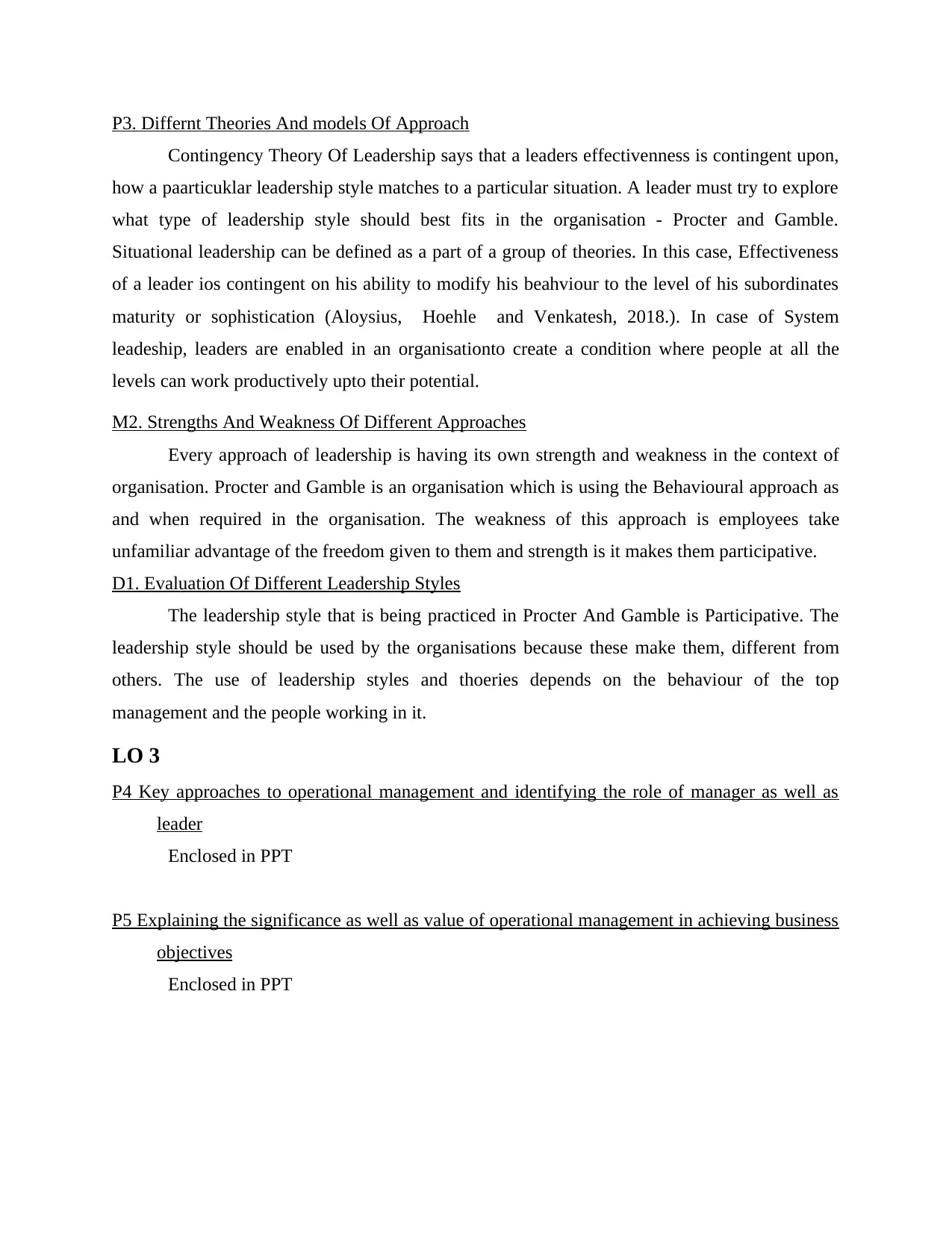
P3. Differnt Theories And models Of Approach
Contingency Theory Of Leadership says that a leaders effectivenness is contingent upon,
how a paarticuklar leadership style matches to a particular situation. A leader must try to explore
what type of leadership style should best fits in the organisation - Procter and Gamble.
Situational leadership can be defined as a part of a group of theories. In this case, Effectiveness
of a leader ios contingent on his ability to modify his beahviour to the level of his subordinates
maturity or sophistication (Aloysius, Hoehle and Venkatesh, 2018.). In case of System
leadeship, leaders are enabled in an organisationto create a condition where people at all the
levels can work productively upto their potential.
M2. Strengths And Weakness Of Different Approaches
Every approach of leadership is having its own strength and weakness in the context of
organisation. Procter and Gamble is an organisation which is using the Behavioural approach as
and when required in the organisation. The weakness of this approach is employees take
unfamiliar advantage of the freedom given to them and strength is it makes them participative.
D1. Evaluation Of Different Leadership Styles
The leadership style that is being practiced in Procter And Gamble is Participative. The
leadership style should be used by the organisations because these make them, different from
others. The use of leadership styles and thoeries depends on the behaviour of the top
management and the people working in it.
LO 3
P4 Key approaches to operational management and identifying the role of manager as well as
leader
Enclosed in PPT
P5 Explaining the significance as well as value of operational management in achieving business
objectives
Enclosed in PPT
Contingency Theory Of Leadership says that a leaders effectivenness is contingent upon,
how a paarticuklar leadership style matches to a particular situation. A leader must try to explore
what type of leadership style should best fits in the organisation - Procter and Gamble.
Situational leadership can be defined as a part of a group of theories. In this case, Effectiveness
of a leader ios contingent on his ability to modify his beahviour to the level of his subordinates
maturity or sophistication (Aloysius, Hoehle and Venkatesh, 2018.). In case of System
leadeship, leaders are enabled in an organisationto create a condition where people at all the
levels can work productively upto their potential.
M2. Strengths And Weakness Of Different Approaches
Every approach of leadership is having its own strength and weakness in the context of
organisation. Procter and Gamble is an organisation which is using the Behavioural approach as
and when required in the organisation. The weakness of this approach is employees take
unfamiliar advantage of the freedom given to them and strength is it makes them participative.
D1. Evaluation Of Different Leadership Styles
The leadership style that is being practiced in Procter And Gamble is Participative. The
leadership style should be used by the organisations because these make them, different from
others. The use of leadership styles and thoeries depends on the behaviour of the top
management and the people working in it.
LO 3
P4 Key approaches to operational management and identifying the role of manager as well as
leader
Enclosed in PPT
P5 Explaining the significance as well as value of operational management in achieving business
objectives
Enclosed in PPT
⊘ This is a preview!⊘
Do you want full access?
Subscribe today to unlock all pages.

Trusted by 1+ million students worldwide
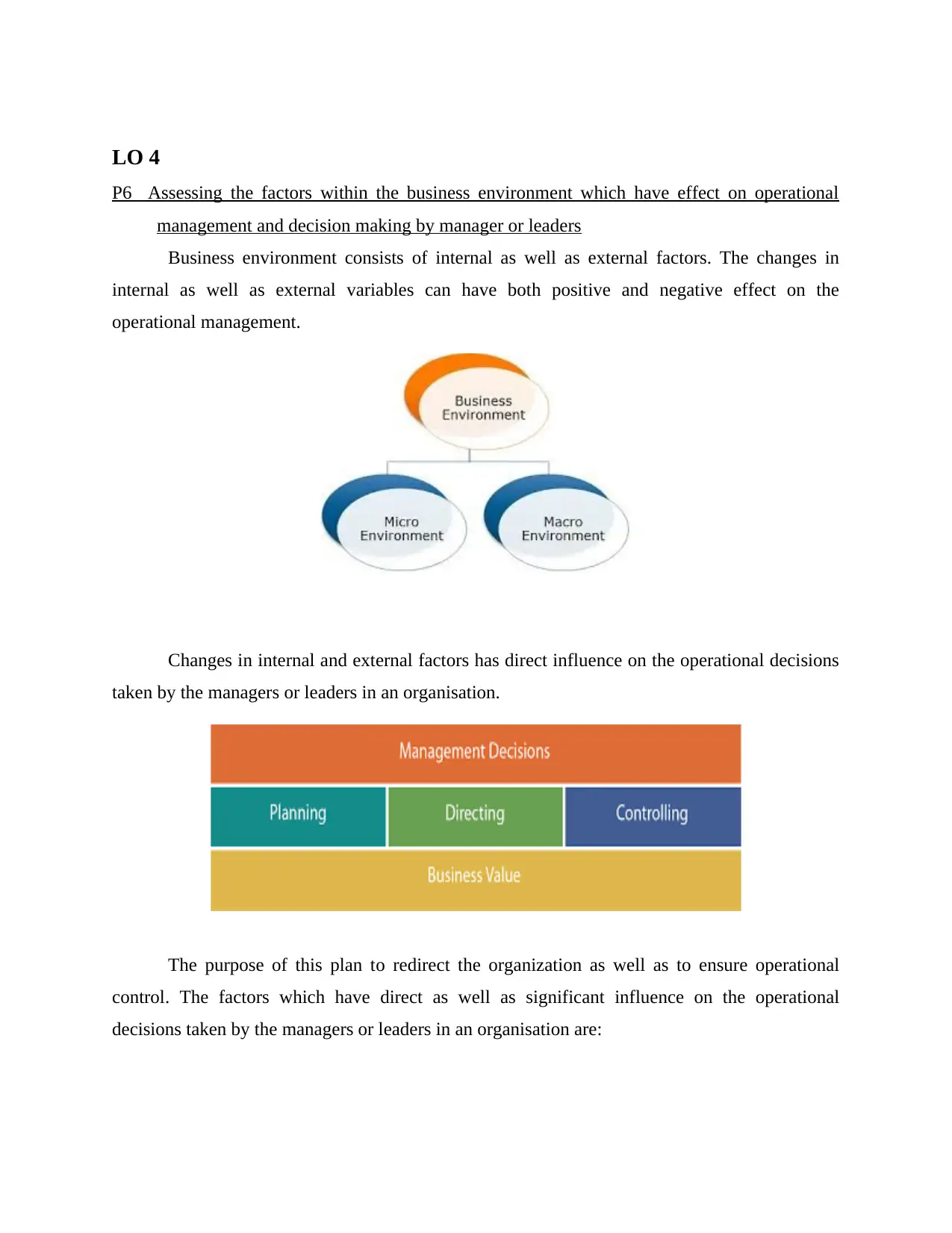
LO 4
P6 Assessing the factors within the business environment which have effect on operational
management and decision making by manager or leaders
Business environment consists of internal as well as external factors. The changes in
internal as well as external variables can have both positive and negative effect on the
operational management.
Changes in internal and external factors has direct influence on the operational decisions
taken by the managers or leaders in an organisation.
The purpose of this plan to redirect the organization as well as to ensure operational
control. The factors which have direct as well as significant influence on the operational
decisions taken by the managers or leaders in an organisation are:
P6 Assessing the factors within the business environment which have effect on operational
management and decision making by manager or leaders
Business environment consists of internal as well as external factors. The changes in
internal as well as external variables can have both positive and negative effect on the
operational management.
Changes in internal and external factors has direct influence on the operational decisions
taken by the managers or leaders in an organisation.
The purpose of this plan to redirect the organization as well as to ensure operational
control. The factors which have direct as well as significant influence on the operational
decisions taken by the managers or leaders in an organisation are:
Paraphrase This Document
Need a fresh take? Get an instant paraphrase of this document with our AI Paraphraser
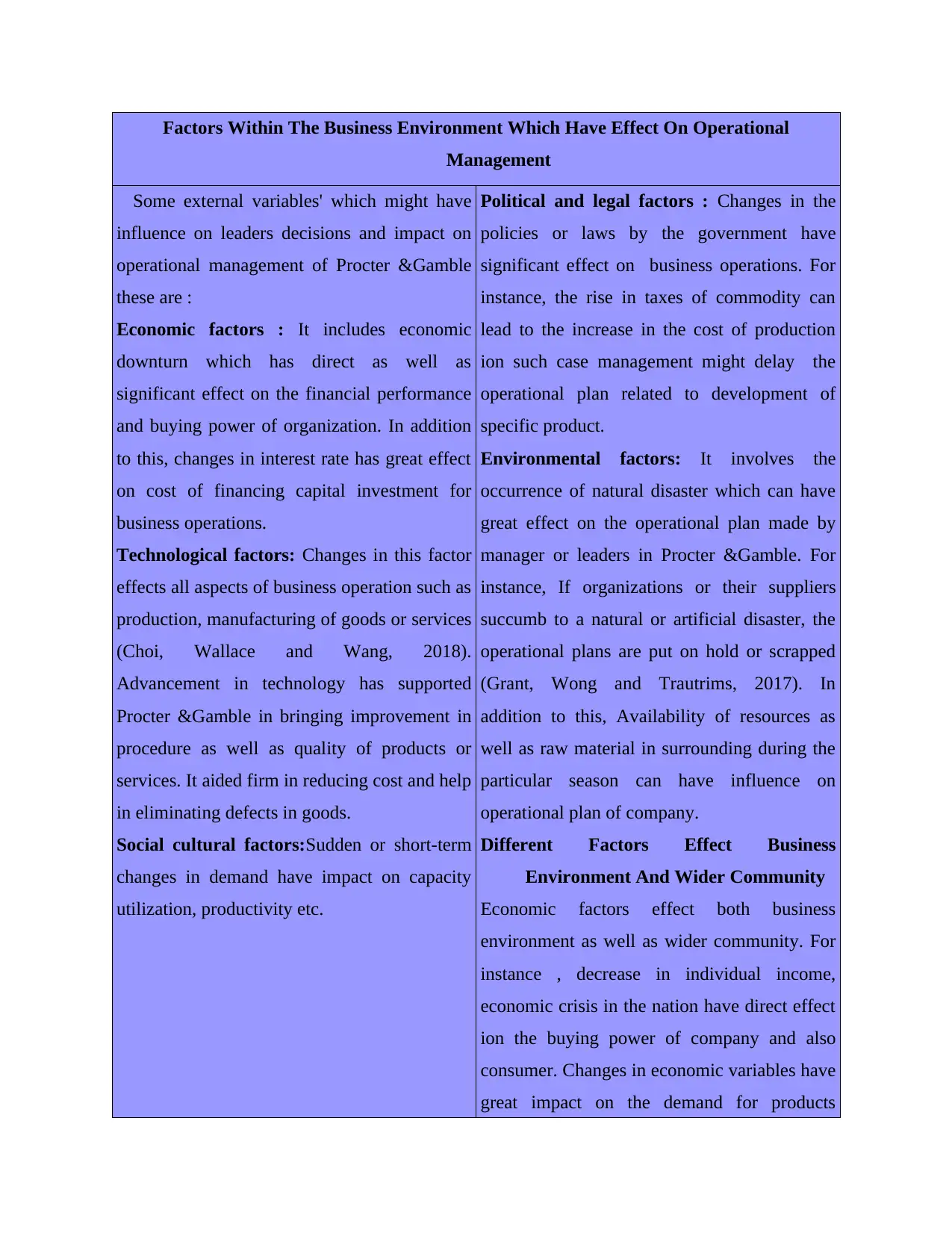
Factors Within The Business Environment Which Have Effect On Operational
Management
Some external variables' which might have
influence on leaders decisions and impact on
operational management of Procter &Gamble
these are :
Economic factors : It includes economic
downturn which has direct as well as
significant effect on the financial performance
and buying power of organization. In addition
to this, changes in interest rate has great effect
on cost of financing capital investment for
business operations.
Technological factors: Changes in this factor
effects all aspects of business operation such as
production, manufacturing of goods or services
(Choi, Wallace and Wang, 2018).
Advancement in technology has supported
Procter &Gamble in bringing improvement in
procedure as well as quality of products or
services. It aided firm in reducing cost and help
in eliminating defects in goods.
Social cultural factors:Sudden or short-term
changes in demand have impact on capacity
utilization, productivity etc.
Political and legal factors : Changes in the
policies or laws by the government have
significant effect on business operations. For
instance, the rise in taxes of commodity can
lead to the increase in the cost of production
ion such case management might delay the
operational plan related to development of
specific product.
Environmental factors: It involves the
occurrence of natural disaster which can have
great effect on the operational plan made by
manager or leaders in Procter &Gamble. For
instance, If organizations or their suppliers
succumb to a natural or artificial disaster, the
operational plans are put on hold or scrapped
(Grant, Wong and Trautrims, 2017). In
addition to this, Availability of resources as
well as raw material in surrounding during the
particular season can have influence on
operational plan of company.
Different Factors Effect Business
Environment And Wider Community
Economic factors effect both business
environment as well as wider community. For
instance , decrease in individual income,
economic crisis in the nation have direct effect
ion the buying power of company and also
consumer. Changes in economic variables have
great impact on the demand for products
Management
Some external variables' which might have
influence on leaders decisions and impact on
operational management of Procter &Gamble
these are :
Economic factors : It includes economic
downturn which has direct as well as
significant effect on the financial performance
and buying power of organization. In addition
to this, changes in interest rate has great effect
on cost of financing capital investment for
business operations.
Technological factors: Changes in this factor
effects all aspects of business operation such as
production, manufacturing of goods or services
(Choi, Wallace and Wang, 2018).
Advancement in technology has supported
Procter &Gamble in bringing improvement in
procedure as well as quality of products or
services. It aided firm in reducing cost and help
in eliminating defects in goods.
Social cultural factors:Sudden or short-term
changes in demand have impact on capacity
utilization, productivity etc.
Political and legal factors : Changes in the
policies or laws by the government have
significant effect on business operations. For
instance, the rise in taxes of commodity can
lead to the increase in the cost of production
ion such case management might delay the
operational plan related to development of
specific product.
Environmental factors: It involves the
occurrence of natural disaster which can have
great effect on the operational plan made by
manager or leaders in Procter &Gamble. For
instance, If organizations or their suppliers
succumb to a natural or artificial disaster, the
operational plans are put on hold or scrapped
(Grant, Wong and Trautrims, 2017). In
addition to this, Availability of resources as
well as raw material in surrounding during the
particular season can have influence on
operational plan of company.
Different Factors Effect Business
Environment And Wider Community
Economic factors effect both business
environment as well as wider community. For
instance , decrease in individual income,
economic crisis in the nation have direct effect
ion the buying power of company and also
consumer. Changes in economic variables have
great impact on the demand for products
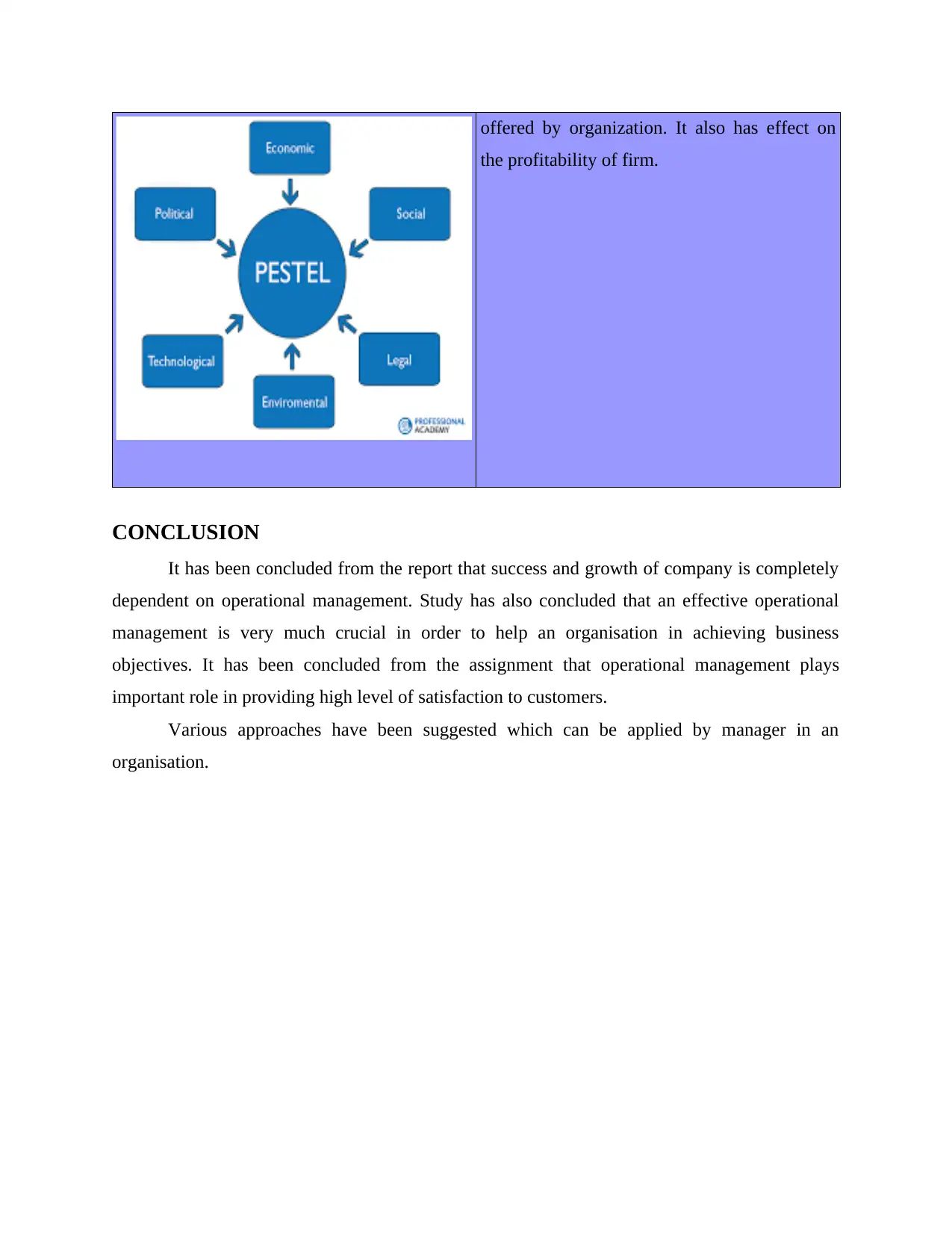
offered by organization. It also has effect on
the profitability of firm.
CONCLUSION
It has been concluded from the report that success and growth of company is completely
dependent on operational management. Study has also concluded that an effective operational
management is very much crucial in order to help an organisation in achieving business
objectives. It has been concluded from the assignment that operational management plays
important role in providing high level of satisfaction to customers.
Various approaches have been suggested which can be applied by manager in an
organisation.
the profitability of firm.
CONCLUSION
It has been concluded from the report that success and growth of company is completely
dependent on operational management. Study has also concluded that an effective operational
management is very much crucial in order to help an organisation in achieving business
objectives. It has been concluded from the assignment that operational management plays
important role in providing high level of satisfaction to customers.
Various approaches have been suggested which can be applied by manager in an
organisation.
⊘ This is a preview!⊘
Do you want full access?
Subscribe today to unlock all pages.

Trusted by 1+ million students worldwide
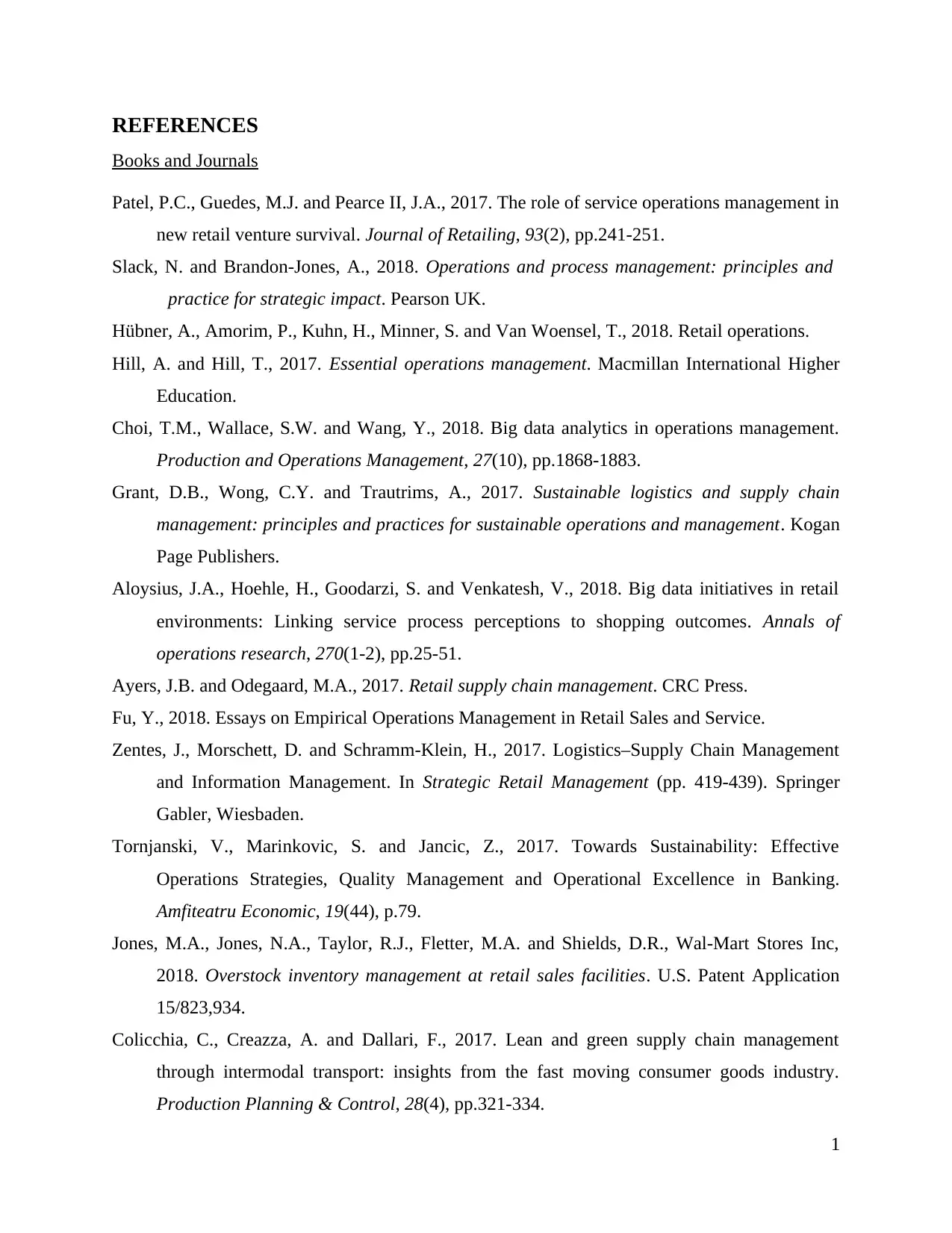
REFERENCES
Books and Journals
Patel, P.C., Guedes, M.J. and Pearce II, J.A., 2017. The role of service operations management in
new retail venture survival. Journal of Retailing, 93(2), pp.241-251.
Slack, N. and Brandon-Jones, A., 2018. Operations and process management: principles and
practice for strategic impact. Pearson UK.
Hübner, A., Amorim, P., Kuhn, H., Minner, S. and Van Woensel, T., 2018. Retail operations.
Hill, A. and Hill, T., 2017. Essential operations management. Macmillan International Higher
Education.
Choi, T.M., Wallace, S.W. and Wang, Y., 2018. Big data analytics in operations management.
Production and Operations Management, 27(10), pp.1868-1883.
Grant, D.B., Wong, C.Y. and Trautrims, A., 2017. Sustainable logistics and supply chain
management: principles and practices for sustainable operations and management. Kogan
Page Publishers.
Aloysius, J.A., Hoehle, H., Goodarzi, S. and Venkatesh, V., 2018. Big data initiatives in retail
environments: Linking service process perceptions to shopping outcomes. Annals of
operations research, 270(1-2), pp.25-51.
Ayers, J.B. and Odegaard, M.A., 2017. Retail supply chain management. CRC Press.
Fu, Y., 2018. Essays on Empirical Operations Management in Retail Sales and Service.
Zentes, J., Morschett, D. and Schramm-Klein, H., 2017. Logistics–Supply Chain Management
and Information Management. In Strategic Retail Management (pp. 419-439). Springer
Gabler, Wiesbaden.
Tornjanski, V., Marinkovic, S. and Jancic, Z., 2017. Towards Sustainability: Effective
Operations Strategies, Quality Management and Operational Excellence in Banking.
Amfiteatru Economic, 19(44), p.79.
Jones, M.A., Jones, N.A., Taylor, R.J., Fletter, M.A. and Shields, D.R., Wal-Mart Stores Inc,
2018. Overstock inventory management at retail sales facilities. U.S. Patent Application
15/823,934.
Colicchia, C., Creazza, A. and Dallari, F., 2017. Lean and green supply chain management
through intermodal transport: insights from the fast moving consumer goods industry.
Production Planning & Control, 28(4), pp.321-334.
1
Books and Journals
Patel, P.C., Guedes, M.J. and Pearce II, J.A., 2017. The role of service operations management in
new retail venture survival. Journal of Retailing, 93(2), pp.241-251.
Slack, N. and Brandon-Jones, A., 2018. Operations and process management: principles and
practice for strategic impact. Pearson UK.
Hübner, A., Amorim, P., Kuhn, H., Minner, S. and Van Woensel, T., 2018. Retail operations.
Hill, A. and Hill, T., 2017. Essential operations management. Macmillan International Higher
Education.
Choi, T.M., Wallace, S.W. and Wang, Y., 2018. Big data analytics in operations management.
Production and Operations Management, 27(10), pp.1868-1883.
Grant, D.B., Wong, C.Y. and Trautrims, A., 2017. Sustainable logistics and supply chain
management: principles and practices for sustainable operations and management. Kogan
Page Publishers.
Aloysius, J.A., Hoehle, H., Goodarzi, S. and Venkatesh, V., 2018. Big data initiatives in retail
environments: Linking service process perceptions to shopping outcomes. Annals of
operations research, 270(1-2), pp.25-51.
Ayers, J.B. and Odegaard, M.A., 2017. Retail supply chain management. CRC Press.
Fu, Y., 2018. Essays on Empirical Operations Management in Retail Sales and Service.
Zentes, J., Morschett, D. and Schramm-Klein, H., 2017. Logistics–Supply Chain Management
and Information Management. In Strategic Retail Management (pp. 419-439). Springer
Gabler, Wiesbaden.
Tornjanski, V., Marinkovic, S. and Jancic, Z., 2017. Towards Sustainability: Effective
Operations Strategies, Quality Management and Operational Excellence in Banking.
Amfiteatru Economic, 19(44), p.79.
Jones, M.A., Jones, N.A., Taylor, R.J., Fletter, M.A. and Shields, D.R., Wal-Mart Stores Inc,
2018. Overstock inventory management at retail sales facilities. U.S. Patent Application
15/823,934.
Colicchia, C., Creazza, A. and Dallari, F., 2017. Lean and green supply chain management
through intermodal transport: insights from the fast moving consumer goods industry.
Production Planning & Control, 28(4), pp.321-334.
1
Paraphrase This Document
Need a fresh take? Get an instant paraphrase of this document with our AI Paraphraser
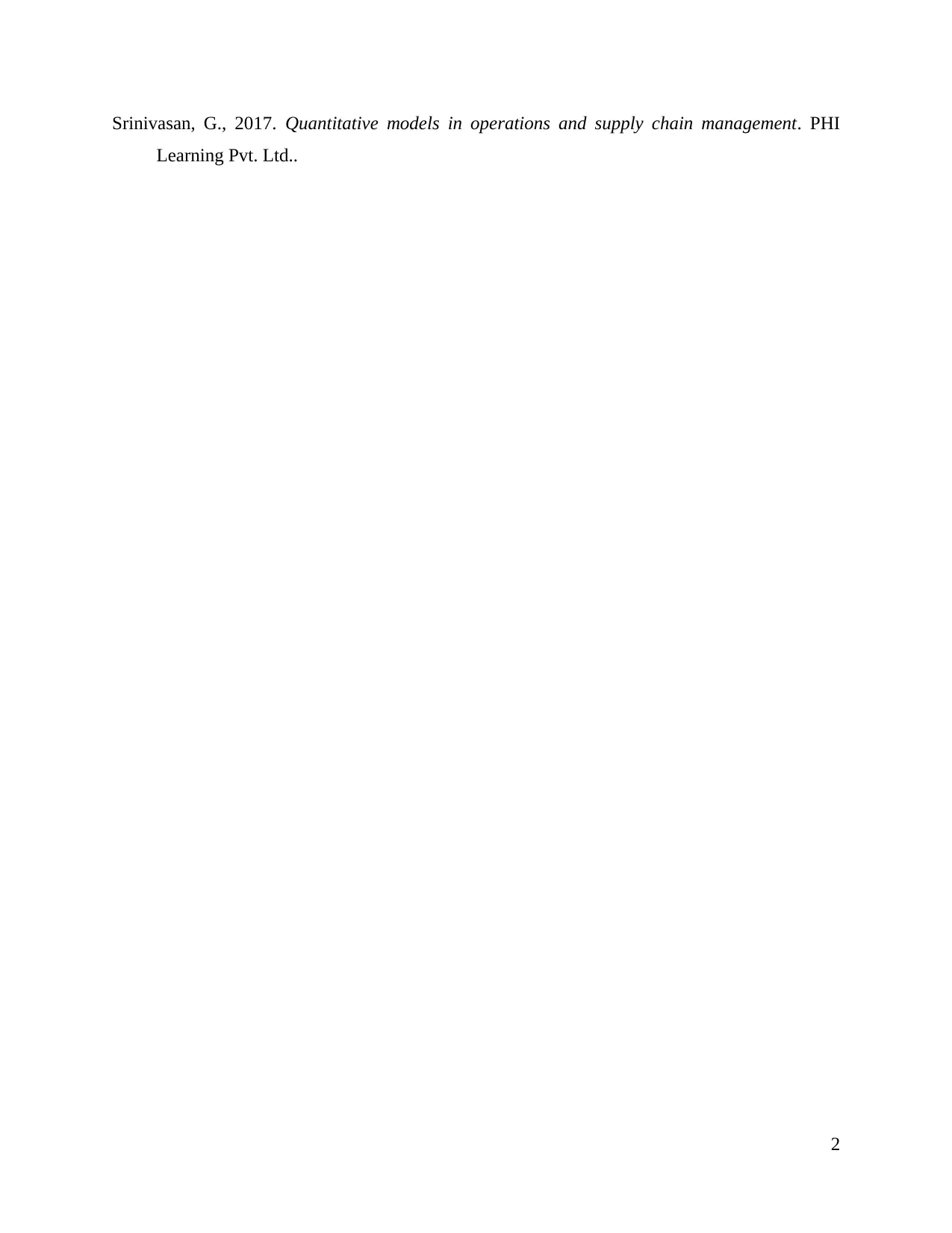
Srinivasan, G., 2017. Quantitative models in operations and supply chain management. PHI
Learning Pvt. Ltd..
2
Learning Pvt. Ltd..
2
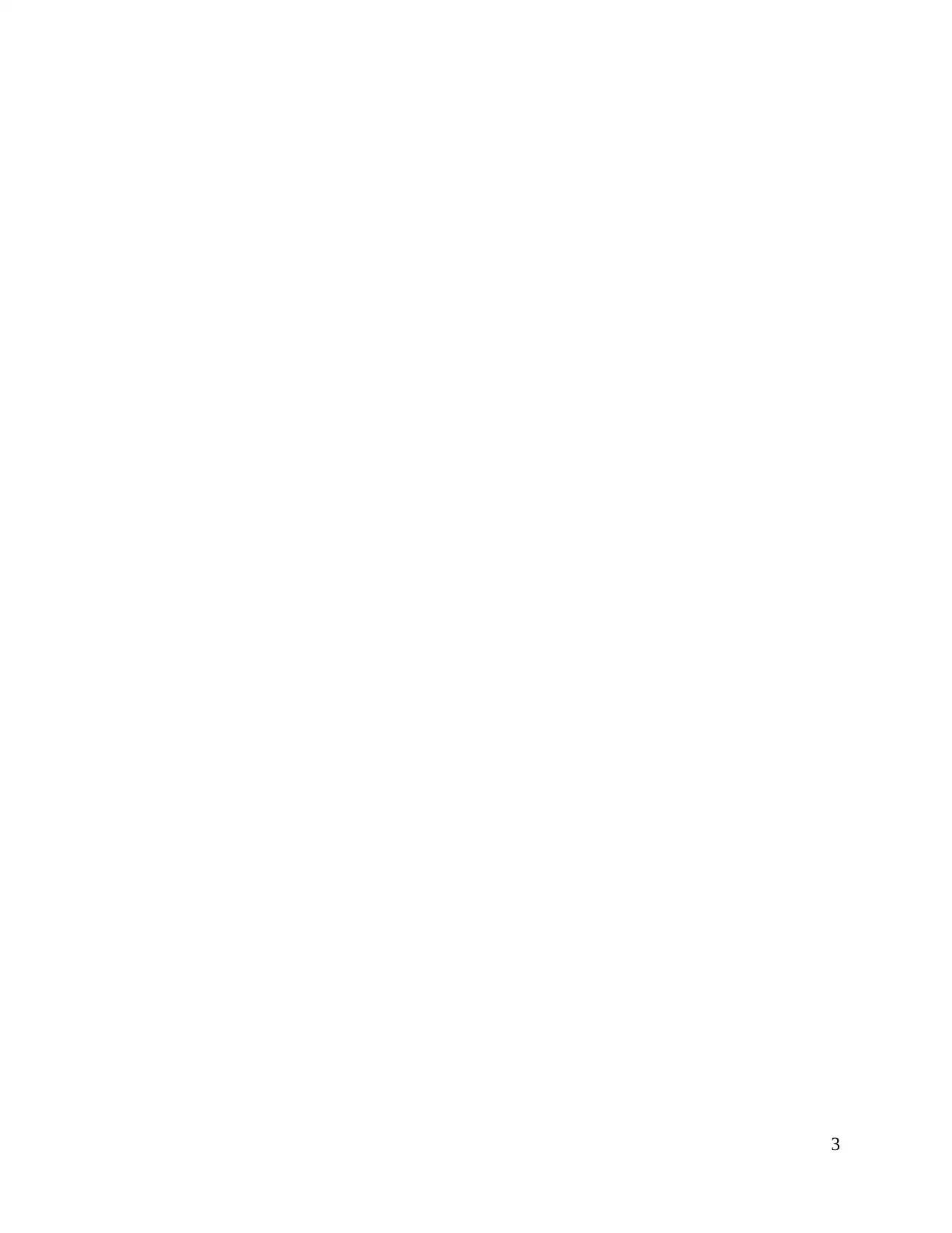
3
⊘ This is a preview!⊘
Do you want full access?
Subscribe today to unlock all pages.

Trusted by 1+ million students worldwide
1 out of 12
Related Documents
Your All-in-One AI-Powered Toolkit for Academic Success.
+13062052269
info@desklib.com
Available 24*7 on WhatsApp / Email
![[object Object]](/_next/static/media/star-bottom.7253800d.svg)
Unlock your academic potential
Copyright © 2020–2026 A2Z Services. All Rights Reserved. Developed and managed by ZUCOL.




